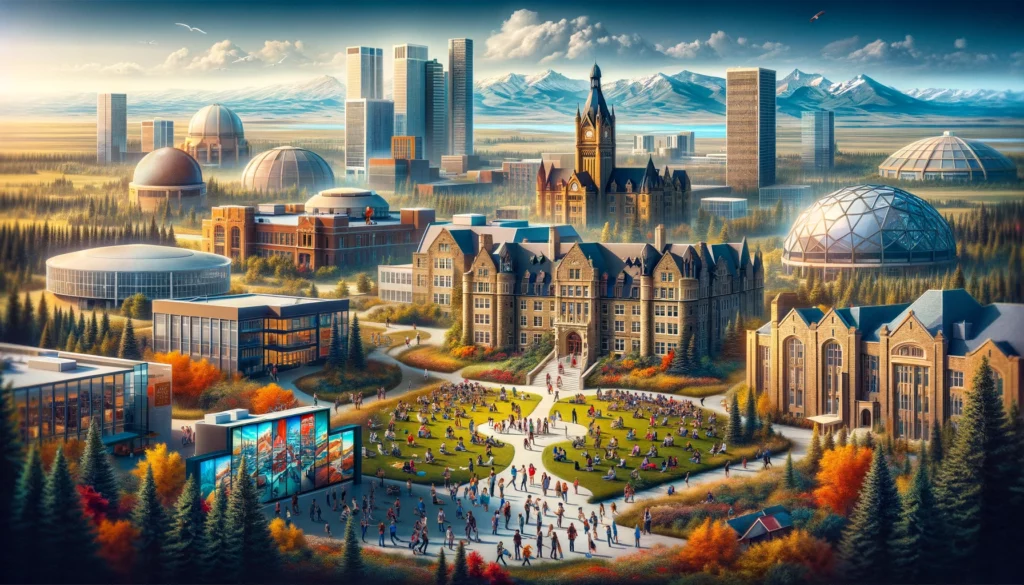Table of contents
- Discover Your Eligibility for Canadian Immigration
- The Appeal of Alberta
- Housing in Alberta
- Commuting and Transportation
- Employment Opportunities
- Healthcare System
- Education
- Universities
- Alberta University of the Arts (AUArts)
- Ambrose University
- Athabasca University
- Bow Valley College
- Burman University
- Concordia University of Edmonton
- Keyano College
- Lakeland College
- Lethbridge College
- MacEwan University
- Medicine Hat College
- Mount Royal University
- NorQuest College
- NAIT
- Northern Lakes College
- Northwestern Polytechnic
- Olds College
- Portage College
- Red Deer Polytechnic
- SAIT
- St. Mary’s University
- The Banff Centre
- The King’s University
- University of Alberta
- University of Calgary
- University of Lethbridge
- Taxation in Alberta
- Newcomer Services
- Conclusion
- Pax Law can help you!
Moving and immigrating to Alberta, Canada, represents a journey into a province known for its economic prosperity, natural beauty, and high quality of life. Alberta, one of the larger provinces in Canada, is flanked by British Columbia to the west and Saskatchewan to the east. It offers a unique blend of urban sophistication and outdoor adventure, making it an attractive destination for newcomers from around the world. This comprehensive guide explores various aspects of living in Alberta, from immigration eligibility to housing, employment, and healthcare, among others.

Discover Your Eligibility for Canadian Immigration
Alberta has become a popular destination for immigrants, with approximately 1 million newcomers settling here. The province’s immigration pathways, such as the Alberta Immigrant Nominee Program (AINP) and federal programs like Express Entry, provide various options for those looking to make Alberta their new home. It’s crucial to explore these options to understand your eligibility and the best route for your circumstances.
The Appeal of Alberta
Alberta’s allure lies not only in its vibrant cities like Calgary, Edmonton, and Lethbridge but also in its stunning landscapes that offer countless outdoor activities. The province boasts higher income levels than the rest of Canada, with the highest median after-tax income, contributing to a relatively higher standard of living.
Housing in Alberta
With over 4.6 million residents, Alberta’s housing market is diverse, ranging from urban apartments to rural homes. The rental market is active, with average rents for one-bedroom apartments varying across major cities. Calgary, for instance, had an average rent of $1,728, while Edmonton and Lethbridge were more affordable. The Government of Alberta provides resources like the Digital Service and Affordable Housing Resources to assist in finding suitable accommodation.
Commuting and Transportation
A significant majority of Alberta’s residents live within close proximity to public transit access points. Calgary and Edmonton feature train transit systems, complementing extensive bus networks. Despite the convenience of public transit, many still prefer personal vehicles, highlighting the importance of obtaining an Alberta driver’s license for newcomers.
Employment Opportunities
The province’s economy is robust, with trade occupations, healthcare, and construction being the largest employment sectors. Alberta employs a substantial number of people in these industries, reflecting the diversity and opportunity within its job market. Provincial resources like ALIS, AAISA, and Alberta Supports are invaluable for job seekers, especially immigrants.
Healthcare System
Alberta mandates a three-month waiting period for newcomers seeking public healthcare coverage. After this period, residents can access a wide range of healthcare services with a provincial health card. While public health services are comprehensive, certain medications and treatments might require out-of-pocket expenses.
Education
Alberta prides itself on a free public education system from kindergarten through high school, with optional private schooling available. The province also boasts over 150 Designated Learning Institutions (DLIs) for post-secondary education, many of which offer programs eligible for the Post Graduation Work Permit (PGWP), facilitating work opportunities in Canada after graduation.

Universities
Embarking on a journey to pursue higher education in Alberta offers a diverse landscape of opportunities across various institutions, each with its unique offerings, specializations, and community environments. From arts and design to theology and technology, Alberta’s universities and colleges cater to a wide range of interests and career aspirations. Here’s a closer look at what prospective students can expect:
Alberta University of the Arts (AUArts)
- Location: Calgary.
- Focus on hands-on learning in art, design, and media.
- Features small class sizes and individual attention from successful artists and designers.
- Hosts international speakers and workshops.
- Offers 11 degree programs across four schools: Craft + Emerging Media, Visual Arts, Communication Design, Critical + Creative Studies.
- Provides academic support, writing assistance, and counseling services.
- International students group organizes visits to Alberta historic sites.
Ambrose University
- Located in Calgary.
- Known for dynamic learning environment, high-caliber professors, and small classes.
- Offers community beyond the classroom with spiritual formation and athletics.
- Houses the Canadian Chinese School of Theology, offering programs in Mandarin.
Athabasca University
- Pioneers distance education, serving over 40,000 students globally.
- Offers flexible learning anywhere, anytime.
- Maintains over 350 collaborative agreements worldwide.
Bow Valley College
- Located in downtown Calgary.
- Prepares individuals for work or further study with a focus on applied learning.
- Offers certificate and diploma programs.
- Provides English as a Second Language (ESL) programs.
Burman University
- Christian university in Central Alberta.
- Offers a family-like atmosphere and more than 20 undergraduate degree programs.
Concordia University of Edmonton
- Offers a personalized learning experience with a 14:1 student to instructor ratio.
- Focuses on community where students can develop interests and make a difference.
Keyano College
- Located in Fort McMurray.
- Offers diplomas, certificates, apprenticeships, and degree programs.
- Focuses on cooperative education, allowing students to earn while they learn.
Lakeland College
- Campuses in Lloydminster and Vermilion.
- Offers over 50 diverse study options.
- Focuses on practical skills and knowledge for career or further study.
Lethbridge College
- Alberta’s first public college.
- Provides over 50 career programs.
- Emphasizes industry-standard skills and knowledge.
MacEwan University
- Located in Edmonton.
- Offers a broad range of educational opportunities including degrees, diplomas, and certificates.
- Focuses on small class sizes and personalized learning.
Medicine Hat College
- Offers more than 40 certificate, diploma, degree programs.
- Provides a personal, engaging campus community.
Mount Royal University
- Located in Calgary.
- Focuses on teaching and learning for student success.
- Offers 12 unique degrees in 32 areas.
NorQuest College
- Located in the Edmonton region.
- Offers full-time, part-time, distance learning, and regional programs.
- Recognized for ESL programs and a diverse student body.
NAIT
- Provides hands-on, technology-based learning.
- Offers credentials including degrees, diplomas, and certificates.
Northern Lakes College
- Offers programming across north central Alberta.
- Focuses on accessible and effective educational services.
Northwestern Polytechnic
- Campuses based in the northwestern Alberta communities of Fairview and Grande Prairie.
- Offers a variety of certificate, diploma, and degree options.
Olds College
- Specializes in agriculture, horticulture, and land and environmental management.
- Emphasizes hands-on training and applied research.
Portage College
- Offers a flexible first-class educational experience.
- Located in Lac La Biche with regional and community campuses.
Red Deer Polytechnic
- Offers diverse programs and credentials.
- Focuses on applied research and innovation.
SAIT
- Located close to downtown Calgary.
- Offers a multicultural environment and a wide range of programs.
St. Mary’s University
- Integrates the Christian faith into education.
- Offers degrees in arts, science, and education.
The Banff Centre
- Globally respected arts, cultural, and educational institution.
- Located in Banff National Park.
The King’s University
- Christian institution in Edmonton.
- Offers a university education in the arts, sciences, and professional areas.
University of Alberta
- Leading research university.
- Offers a wide range of undergraduate and graduate programs.
University of Calgary
- Research-intensive university.
- Recognized for its research breakthroughs in various fields.
University of Lethbridge
- Offers undergraduate and graduate students an unparalleled education experience.
- Campuses in Lethbridge, Calgary, and Edmonton.

Taxation in Alberta
Residents enjoy a lower tax burden in Alberta, with only a 5% Goods and Services Tax (GST) and no provincial sales tax. Income tax is levied on a bracketed system, similar to other Canadian provinces but remains competitive within the national context.
Newcomer Services
Alberta offers comprehensive settlement services to support newcomers, including pre-arrival resources and community support. Additionally, Immigration, Refugees and Citizenship Canada (IRCC) provides government-funded services to assist with job hunting, housing, and enrolling children in school.
Conclusion
Alberta is a province that offers a blend of economic opportunity, high-quality education, accessible healthcare, and a vibrant cultural life set against the backdrop of its natural landscapes. For those planning to move or immigrate to Alberta, it’s essential to research and make informed decisions about immigration pathways, housing, employment, and settling in. With the right preparation, newcomers can thrive in Alberta, enjoying the high standard of living and the diverse opportunities it provides.
Pax Law can help you!
Our immigration lawyers and consultants are willing, ready, and able to assist you. Please visit our appointment booking page to make an appointment with one of our lawyers or consultants; alternatively, you can call our offices at +1-604-767-9529.


0 Comments